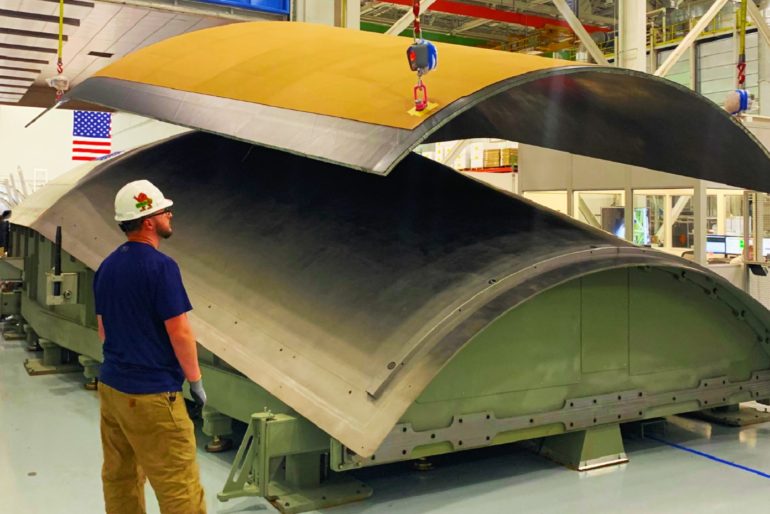In June of 2017, Dynetics began to aggressively work to meet the schedule commitments and project milestones to build the Universal Stage Adapter (USA) for NASA’s Space Launch System (SLS). SLS, a powerful, advanced heavy-lift launch vehicle, is designed to be flexible and evolvable for deep-space destinations. The USA will stand 32.4 feet tall and will measure 27.6 feet in diameter at its largest point, providing the ability to accommodate the Exploration Upper Stage and large payloads on the evolved SLS Block 1B and future configurations.
The Dynetics/RUAG Space USA team recently completed the USA composite panel Manufacturing Test Demonstrator (MTD). The MTD is a full size USA panel, representing one of four panels that comprise a complete USA. This demonstration panel in an important step along the path to building the USA flight hardware at the Dynetics and RUAG facilities in Decatur, Alabama.
“Our team has worked with the RUAG team to complete this MTD panel that will be used to validate manufacturing, handling and testing aspects of the design before steaming ahead to manufacture the flight hardware,” said Robert Wright, Dynetics’ USA project manager. “This panel is a result of our teams working closely with NASA to reach a high fidelity design baseline well ahead of the USA Critical Design Review, allowing us to purchase the long-lead bonding mold required to make full scale USA composite panels.”
RUAG will use the MTD as a pathfinder for manufacturing and inspection processes. Once RUAG has completed the panel manufacturing demonstrations, Dynetics will begin system assembly manufacturing demonstrations. The final USA demonstration will include a full length, vertical bonded joint using tooling from both teams at the Dynetics Aerospace Complex.
“The vertical bonded joint technology allows the team to eliminate splice plates and fasteners that are typically used in composite joints,” said Wright. “This results in lower mass for the USA and improved payload lift capability for the SLS rocket.”
Immediately following the MTD operations at the Decatur facilities, the team will be ready to begin work on the complete full-scale Development Test Article (DTA). Dynetics is partnering with NASA’s Marshall Space Flight Center to perform full-scale damage tolerance testing of the USA at Marshall’s test stands, which supports certification of the USA for flight.
Dynetics, a wholly owned subsidiary of Leidos, has grown since its inception, particularly in the space systems division. The division has had a successful relationship with many NASA field centers. Dynetics further supports the SLS program providing critical hardware components, the EGHE and PAS, to the SLS Core and Exploration Upper Stages. Dynetics also holds two contracts with Johnson Space Center for the Orion crew module Laser Air Monitoring System and a demonstration of a miniature carbon dioxide scrubber on the International Space Station.

